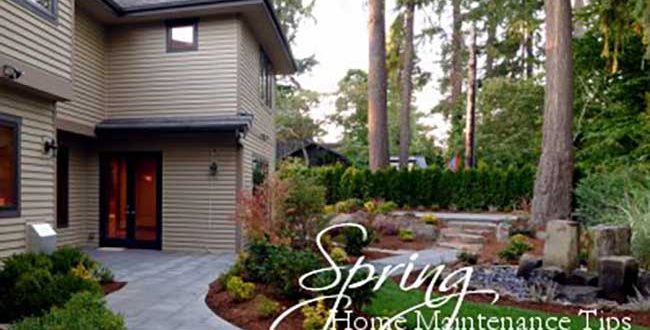Spring Maintenance
Check out our comprehensive checklist for undoing winter’s damage to your home.
Like many of us, homes need a tune-up after the long winter months. Everything from the roof to the sump pump needs a once-over after the season has taken its toll. To help you cover all the bases, we’ve come up with a handy spring-maintenance checklist. Consult it every year and your home will thank you.
Inspect Brickwork and Stucco
Spalling is a chipping or popping away of a brick’s face, leaving the brick’s interior susceptible to moisture and crumbling. Look for this and any deteriorated mortar that typically occurs on older homes.
Is your brick plagued with efflorescence, those unsightly white deposits caused by soluble salts left behind during water evaporation? The Brick Industry Association recommends dry brushing in warm, dry weather to remove it.
If you discover water penetration in brick, consider sealing the brick with an appropriate sealant.
Replace Rotted Siding or Trim, and Repaint as Necessary
Repainting siding or trim is often more than a one-weekend project. For color consistency, you just can’t just touch it up—you need to paint a whole section.
Clean Gutters and Downspouts
Make sure gutters and downspouts direct water away from the house.
If you live in a place where there’s a lot of freezing and thawing, gutters will expand and contract, so make sure they’re flush to the roof, with no sags or dips.
Get a professional cleaning if you live in a two-story house. Do-it-yourselfers will be safer cleaning a ranch home.
Consider installing gutter guards.
Inspect Your Roof
Shingles that curl (turn up) and claw (turn down) can make your roof inefficient and susceptible to leaks. Call a minimum of three roofers before committing to one for repairs. You’ll educate yourself in the process and end up with a better deal.
Get a Chimney Checkup
Have a professional chimney sweep clean and inspect your active or decorative chimney. Professionals should also check the chimney flue and cap for cracks or leaking.
Don’t Overlook Your Attic
Check your attic for proper ventilation and birds’ nests.
Look for obstructions over vents, damaged soffit panels, roof flashing leaks and wet spots on insulation. Keeping a good airflow will save you when it comes to cooling costs.
When you’re rooting around, wear long sleeves and gloves to protect yourself from insulation.
Check Your Heat/Air Unit; Change Batteries in Detectors
Change filters and clean the air purifier as needed.
Have your ducts professionally cleaned. It’ll make your indoor air quality healthier and your furnace more efficient.
Change batteries on smoke and carbon monoxide detectors.
Prune Landscaping and Create Good Drainage
Shrubs and landscaping help against soil erosion and should be planted to form a negative grade, which means water will flow away from the house.
Give Concrete a Little TLC
Seal and inspect asphalt or concrete driveways. Most of us put off sealing driveways until the fall, but the spring is an ideal time to do it. The sealer you use, the driveway material and climate will affect how often you need to seal your driveway.
Power-wash concrete patios, and inspect decks for rotting wood and secure railings. Seal both if necessary.
Have a professional service your pool.
Weatherproof Windows and Doors
Remove interior storm windows (old homes only) and replace screens on clean windows and doors. If you don’t have air conditioning, you want to make sure you have good airflow throughout the home. You can also save on utility bills by adding blinds to windows that face south and west. Open windows when the sun sets and closing them at sunrise.
Examine putty and caulk lines around exterior windows and doors, and ensure that weather stripping creates a good seal.
Don’t Forget the Sump Pump
Make sure the sump pump is operating correctly, and install a battery backup pump. The backup, another pump that floats above the original pump, will kick on when the electricity goes out. If your sump pump fails, an alarm goes off, letting you know the backup is working. A few hundred dollars will save you thousands in water damage.
https://www.hgtv.com/design/decorating/clean-and-organize/spring-maintenance



